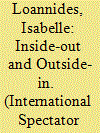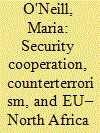| Srl | Item |
| 1 |
ID:
129973


|
|
|
|
|
| Publication |
2014.
|
| Summary/Abstract |
The EU has increasingly intensified the link between its internal and external security concerns and needs, particularly in relation to its neighbours (the Western Balkans and the southern Mediterranean). This adaptation at legal, institutional, strategic and operational levels has sought to improve the coherence and effectiveness of EU external action. Yet, for the Union to tackle ongoing and new challenges in the immediate neighbourhood with today's financial and political constraints, it must be resourceful. The EU should make 'smart' use of its tools and capitalise on existing assets (reinforce the comprehensive approach, strengthen broad-based dialogue on security in the EU members states, and build relations of trust with third countries) to ensure that reforms in the immediate neighbourhood are sustainable, also for the benefit of long-term EU interests.
|
|
|
|
|
|
|
|
|
|
|
|
|
|
|
|
| 2 |
ID:
138871


|
|
|
|
|
| Summary/Abstract |
The EU is clearly in the process of developing an external dimension to the Area of Freedom, Security and Justice (AFSJ). This paper focuses on ex. Police and Judicial Cooperation in Criminal Matters (PJCCM) provisions. These developments pose specific legal basis issues for the EU, given its complex EU–member state legal relationship, and the inter-institutional balance, all reflected in the treaty framework post-Lisbon. New Court of Justice rulings are now emerging which will assist in this issue. Equally the approach to be taken in developing these relationships will be crucial. This paper proposes the adoption of an Onuf style constructivism in order to best capture the reality of the process that is developing, and has developed for the ex. PJCCM measures internally. This then needs to be allied with a constitutionalism model to ensure a balanced development of all three aspects of the AFSJ.
|
|
|
|
|
|
|
|
|
|
|
|
|
|
|
|